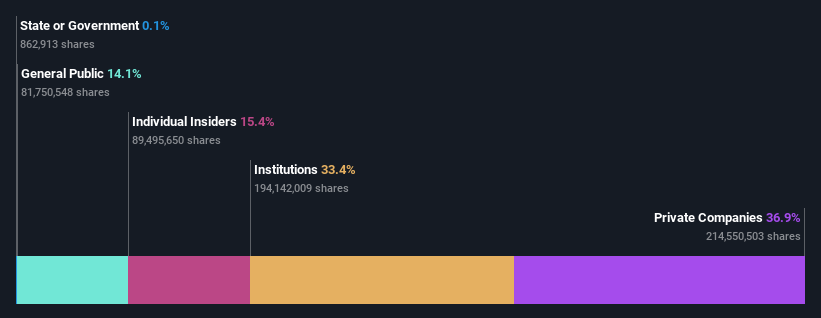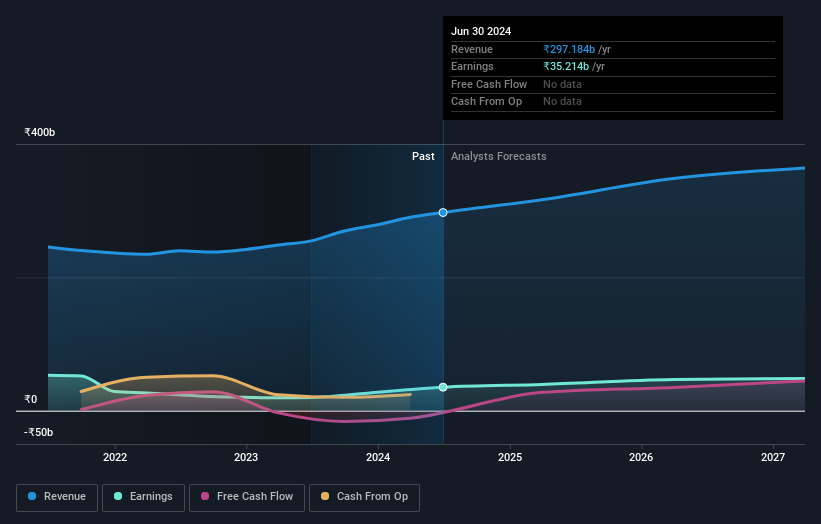Aurobindo Pharma Limited's (NSE:AUROPHARMA) largest shareholders are private companies with 37% ownership, institutions own 33%

Key Insights
- Significant control over Aurobindo Pharma by private companies implies that the general public has more power to influence management and governance-related decisions
- 53% of the business is held by the top 5 shareholders
- 15% of Aurobindo Pharma is held by insiders
If you want to know who really controls Aurobindo Pharma Limited (NSE:AUROPHARMA), then you'll have to look at the makeup of its share registry. The group holding the most number of shares in the company, around 37% to be precise, is private companies. In other words, the group stands to gain the most (or lose the most) from their investment into the company.
Meanwhile, institutions make up 33% of the company’s shareholders. Institutions often own shares in more established companies, while it's not unusual to see insiders own a fair bit of smaller companies.
In the chart below, we zoom in on the different ownership groups of Aurobindo Pharma.
See our latest analysis for Aurobindo Pharma

What Does The Institutional Ownership Tell Us About Aurobindo Pharma?
Institutional investors commonly compare their own returns to the returns of a commonly followed index. So they generally do consider buying larger companies that are included in the relevant benchmark index.
Aurobindo Pharma already has institutions on the share registry. Indeed, they own a respectable stake in the company. This implies the analysts working for those institutions have looked at the stock and they like it. But just like anyone else, they could be wrong. When multiple institutions own a stock, there's always a risk that they are in a 'crowded trade'. When such a trade goes wrong, multiple parties may compete to sell stock fast. This risk is higher in a company without a history of growth. You can see Aurobindo Pharma's historic earnings and revenue below, but keep in mind there's always more to the story.

We note that hedge funds don't have a meaningful investment in Aurobindo Pharma. Penaka Family Trust is currently the company's largest shareholder with 35% of shares outstanding. Kambam Reddy is the second largest shareholder owning 5.6% of common stock, and HDFC Asset Management Company Limited holds about 4.4% of the company stock. Kambam Reddy, who is the second-largest shareholder, also happens to hold the title of Chief Executive Officer.
Our research also brought to light the fact that roughly 53% of the company is controlled by the top 5 shareholders suggesting that these owners wield significant influence on the business.
Researching institutional ownership is a good way to gauge and filter a stock's expected performance. The same can be achieved by studying analyst sentiments. Quite a few analysts cover the stock, so you could look into forecast growth quite easily.
Insider Ownership Of Aurobindo Pharma
The definition of company insiders can be subjective and does vary between jurisdictions. Our data reflects individual insiders, capturing board members at the very least. The company management answer to the board and the latter should represent the interests of shareholders. Notably, sometimes top-level managers are on the board themselves.
Insider ownership is positive when it signals leadership are thinking like the true owners of the company. However, high insider ownership can also give immense power to a small group within the company. This can be negative in some circumstances.
It seems insiders own a significant proportion of Aurobindo Pharma Limited. It is very interesting to see that insiders have a meaningful ₹135b stake in this ₹878b business. It is good to see this level of investment. You can check here to see if those insiders have been buying recently.
General Public Ownership
The general public, who are usually individual investors, hold a 14% stake in Aurobindo Pharma. While this size of ownership may not be enough to sway a policy decision in their favour, they can still make a collective impact on company policies.
Private Company Ownership
Our data indicates that Private Companies hold 37%, of the company's shares. Private companies may be related parties. Sometimes insiders have an interest in a public company through a holding in a private company, rather than in their own capacity as an individual. While it's hard to draw any broad stroke conclusions, it is worth noting as an area for further research.
Next Steps:
I find it very interesting to look at who exactly owns a company. But to truly gain insight, we need to consider other information, too.
I always like to check for a history of revenue growth. You can too, by accessing this free chart of historic revenue and earnings in this detailed graph.
If you would prefer discover what analysts are predicting in terms of future growth, do not miss this free report on analyst forecasts.
NB: Figures in this article are calculated using data from the last twelve months, which refer to the 12-month period ending on the last date of the month the financial statement is dated. This may not be consistent with full year annual report figures.
New: Manage All Your Stock Portfolios in One Place
We've created the ultimate portfolio companion for stock investors, and it's free.
• Connect an unlimited number of Portfolios and see your total in one currency
• Be alerted to new Warning Signs or Risks via email or mobile
• Track the Fair Value of your stocks
Have feedback on this article? Concerned about the content? Get in touch with us directly. Alternatively, email editorial-team (at) simplywallst.com.
This article by Simply Wall St is general in nature. We provide commentary based on historical data and analyst forecasts only using an unbiased methodology and our articles are not intended to be financial advice. It does not constitute a recommendation to buy or sell any stock, and does not take account of your objectives, or your financial situation. We aim to bring you long-term focused analysis driven by fundamental data. Note that our analysis may not factor in the latest price-sensitive company announcements or qualitative material. Simply Wall St has no position in any stocks mentioned.
About NSEI:AUROPHARMA
Aurobindo Pharma
A biopharmaceutical company, engages in the manufacture of generic formulations and active pharmaceutical ingredients in India, the United States of America, Europe, Puerto Rico, and internationally.
Undervalued with excellent balance sheet.
Similar Companies
Market Insights
Community Narratives




